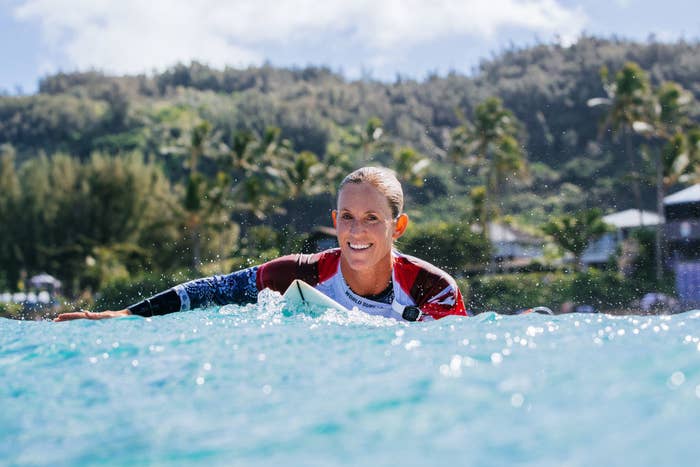
Bethany Hamilton, a pro surfer best known for her memoir Soul Surfer and her arm being bitten off in a shark attack, announced she would no longer compete in World Surf League events after the organization updated its policies to allow trans women to compete in women’s events.
On Sunday, Hamilton, 33, posted on Instagram in response to the organization's policy, stating that she was speaking up for the other women on tour who fear being ostracized for their views.
The WSL’s new policy requires transgender women to maintain testosterone levels lower than 5 nanomoles per liter for at least a year, in addition to having a “female” or “X” gender marker on a passport or national identity card.
For transgender men, the WSL does not state any hormone threshold and only requires athletes to have a “male” gender marker on official identification documents.
“Is a hormone level an honest and accurate depiction that someone is indeed a male or female? Is it as simple as this?” Hamilton asks in her Instagram video.
Of course not.
Hormone testing has long been leveraged against not only trans women but cisgender women who have naturally high levels of testosterone.
South African runner Caster Semenya, a two-time Olympian once deemed the world’s fastest woman, was barred in 2017 from competing in future Olympics because she refused to take drugs to reduce her body’s own high testosterone levels.
But that’s not what Hamilton is talking about.
The pro surfer used misgendering language to refer to trans women in the sport and said she wanted to make sure the future of women’s surfing is protected from what she sees as “glimpses of...dominance” by trans athletes.
In response to Hamilton’s trans-exclusionary comments, some creators on TikTok made videos siding with sharks — referencing the traumatic shark attack in which the then-13-year-old surfer’s left arm was bitten off.
The pressure to define a policy for transgender surfers intensified after Sasha Jane Lowerson became the first openly trans woman to win the women’s open in Australia in May 2022.
“Unfortunately, when a trans athlete is successful a lot of people want to jump up and down. But there are also a lot of people that want to celebrate it, which is a positive thing,” Lowerson told the Inertia magazine after her victory.
Inertia also reported last week that WSL Chief of Sport Jessi Miley-Dyer and Chief Medical Officer Allan MacKillop came to the policy decision together.
“The WSL will not test transgender athletes [for testosterone levels] ourselves,” Miley-Dyer said. “Athletes will arrange their own testing, then come to our chief medical officer to have a confidential conversation and show medical documentation.”
Many Olympic sports do not currently have an official policy regarding hormone levels. The International Cycling Union requires transgender women athletes to test below 2.5 nanomoles per liter for two years to be eligible, which is considered an average range for cisgender women.
Yet across the US, numerous state legislatures are pushing bills that would restrict the access of trans youth from participating on the sports team that aligns with their gender identity.
Hamilton proposed that the WSL create a separate division for trans athletes altogether — and she isn’t alone. After Surfing Australia, a part of the International Surfing Association, shared guidance that was inclusive of transgender surfers, pro surfer Kelly Slater and others called for a “trans division.”
